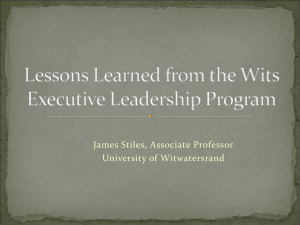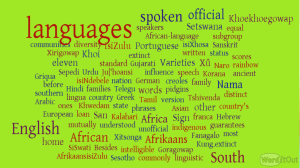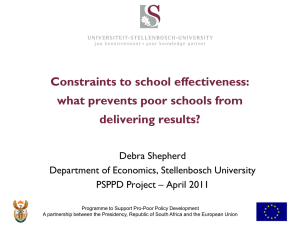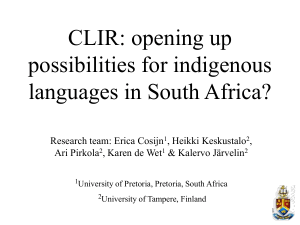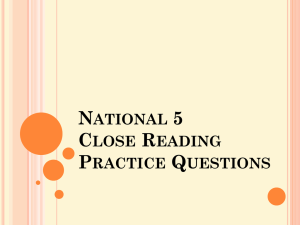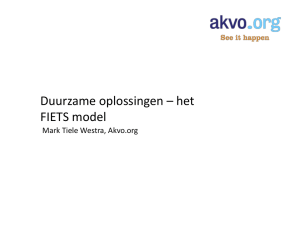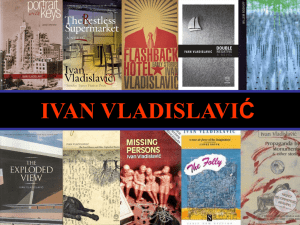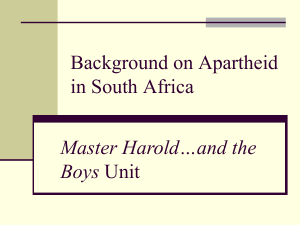matrix language turnover
advertisement
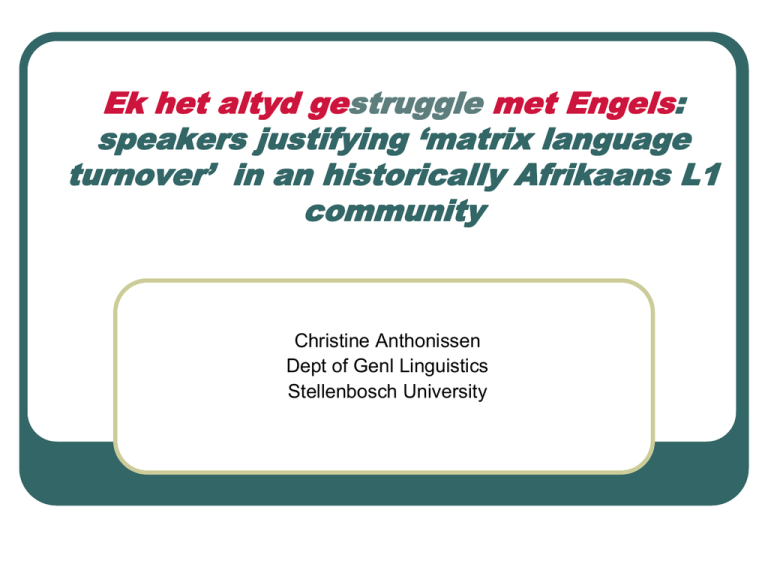
Ek het altyd gestruggle met Engels: speakers justifying ‘matrix language turnover’ in an historically Afrikaans L1 community Christine Anthonissen Dept of Genl Linguistics Stellenbosch University Overview Language diversity in South Africa The languages of the Western Cape Origin and distribution of Afrikaans Perceived ‘language shift’ from Afrikaans to English – illustrative data Evidence of ‘matrix language turnover’ “Premeditated” language shift? Precursor to language death? Conclusion – further work Distribution of official languages in South Africa Predominant languages by province (Census 2001) isiZulu (21%), Afrikaans (14%), Sesotho (13%), English (12%) Eastern Cape - isiXhosa (83%), Afrikaans (9%) Free State Sesotho (64%), Afrikaans (12%) KwaZulu-Natal - isiZulu (81%), English (13%) Limpopo Sepedi (52%), Xitsonga (22%), Tshivenda (16%) Mpumalanga siSwati (31%), isiZulu (26%), isiNdebele (12%) Northern Cape - Afrikaans (68%), Setswana (21%) North West Setswana (65%), Afrikaans (7%) Western Cape - Afrikaans (55%), English (19%), isiXhosa (23%) Gauteng - Distribution of Afrikaans Distribution of English Distribution of isiXhosa Statistics per language Language Number of speakers % of national population Regions most widely used isiZulu 10.7 million 23.8 KwaZulu-Natal, Mpumalanga isiXhosa 7.9 million 17.6 Eastern Cape, Western Cape Afrikaans 6.2 million 13.3 Northern Cape, Western Cape Sepedi 4.2 million 9.4 Limpopo English 3.7 million 8.2 Western Cape, KwaZulu-Natal Setswana 3.7 million 8.2 North-west, Northern Cape Sesotho 3.6 million 7.9 Freestate Xitsonga 2.0 million 4.4 Limpopo siSwati 1.2 million 2.7 Mpumalanga TshiVenda 1.0 million 2.3 Limpopo isiNdebele 712 000 1.6 Mpumalanga Introduction of Dutch (Afrikaans) and English to repertoire of SA lanuages 1652: Dutch East India trading company (VOC) officially established halfway-station ; Preceding this event were 164 years of trading contact, most after 1497 – thus in the 50 yrs before VOC settlement. 1658: introduction of slavery to southern Africa; slaves of varying ethnic backgrounds – most diverse of any recorded slave society (Shell 1994), a ‘polyglot society’; need to communicate not only with Dutch masters, also with fellow workers (Roberge 2002); slavery officially abolished in 1808. 1795: First British occupation; short interlude (1803 – 1806) – by 1820 there were 757 Britons living in Cape Town; British authority initially had “light touch government”, limited interference in established Dutch structures. On the origins of Afrikaans Regarded by some as dialectal variant of Dutch; Sometimes considered a restructured version of Dutch (thus similar to an L2 variety of the TL) – imperfect L2-acquisition of Dutch by non-Europeans; Identified by others as “semi-creole” (McWhorter 1998) cf. Virgin Islands Creole Dutch which has no inflexional affixes, vs. Afrikaans which retained the bulk of Dutch derivational morphology; Den Besten (1989) suggests the term “fort creole” (less radical difference from lexifier language than is found in plantation creoles); Roberge (2002), although wary of the “Cafeteria Principle”, claims and illustrates multiple causation. Origins and first speakers of Afrikaans Roberge (2002): Convergence Model of the formation of Afrikaans Dutch of superstrate community was highly variable Jargonized forms of Dutch (and English) emerged among indigenous khoekhoe – served as medium of interethnic communication (MIC) Africans and Asians with no common language used jargonized versions of superstrate Dutch – stable Cape Dutch Pidgin by 1710 MIC drew on range of resources: metropolitan Dutch, Cape Dutch Pidgin, Creole Portuguese, Malay, Khoekhoe dialects – innovation Speech of locally born slaves became elaborated form of Cape Dutch MIC, but not medium for community solidarity (MCS) From 1710 a variation continuum – ‘Cape Dutch Vernacular’ (Deumert 1999, 2001) Terminology Language shift: “when a community gives up a language completely in favour of another one” (Fasold 1984: 213) “where the possibility exists that one language will give way partially or completely to another” (NWT Literacy Council 1999:10) Matrix Language Frame model Matrix Language vs Embedded Language in code-switching: asymmetry in the participation of the languages involved in codeswitching (NB is the open/closed-class distinction (Joshi1985); distinction between content/system morphemes (Myers-Scotton 1993; Myers-Scotton et al 1995, 2000, 2002) identifiability of Matrix Language preference for Matrix Language structure, elements Indicators of language shift in Western Cape Afrikaans community First language Family language Language of education Patterns of use in religious practices Self-reported proficiency Language preference of 3rd generation Matrix language turnover Matrix Language Turnover hypothesis 1. Classic code switching: Language A matrix, Language B embedded 2. Composite code switching: composite of Languages A and B as matrix 3a. Matrix language turnover: Language B matrix, Language A embedded 3b. Monolingualism in Language B (Myers-Scotton 1998; Deuchar & Davies (2009) Data Participants selected – three generations; generation 1 & 2 from Afrikaans L1 families who chose to raise their children as L1 speakers of English Semi-structured interviews: participants specifically asked to reflect on which language they regard to be their L1; generation 2 specifically asked to motivate language choice in bringing up and schooling their children 2003: 3 families, 12 individuals representing 3 generations; 2008/9: 13 families, 30 individuals representing 3 generations 2003: 8-9 hrs recorded; 2008/9: 12-14 hrs recorded Transcription in progress Excerpt: generation 1 Maar, Engels is ‘n iets wat jy oral mee kan gaan. Want But, English is a something that you everywhere with can go. as jy / in baie lande Because if you / in many countries wat jy kan gaan / praat Engels sê hulle. / So ek kannie daar, as ek nou hiervandaan af gaan / ek het in that you can go / speak English, say they. / So I can NEG there, if I now here-from go / I AUX in Durban gewees vir ‘n paar / vir ‘n week/ as jy daar gaan / selfs jou eie mense praat nie met jou Durban p.been for a few / for a week / if you there go / even your own people talk NEG with you Afrikaans nie / hulle almal praat nie Afrikaans nie./ Ek het in Johannesburg gewees vir twee drie dae/ Afrikaans NEG / they everyone talk NEG Afrikaans NEG / I AUX in Johannesburg p.been for two three days / ek het sewe maande daar gewerk / djy moet Engels praat / of jy nou nie / kan of nie maar I AUX seven months there p.work / you must English speak / whether you now NEG/ can or not but djy moet praat. / So Afrikaans is vir jou / goed/ djy’t grootgeword daarmee … you must speak. / So Afrikaans is for you / good / you-AUX were raised therewith Excerpt: generation 2 Wel Jean, jy weet um / die Strand se gemeenskap / veral die Moslem gemeenskap / Well Jean, you know um / the Strand POS community / specially the Moslem community/ hulle het ‘n neiging om hulle taal te meng / soo om vir hulle in Afrikaans they have a tendency to their language mix (non-fin) / so-o to for them in Afrikaans te laat grootword /ek dink nie hulle sal die Afrikaans gepraat het as ‘n standaardtaal nie / (cause) grow up / I think NEG they would the Afrikaans p.speak AUX as a standard language NEG/ dit was een van my primêre redes /tweedens / vir akademiese redes / soos ek jou al voorheen gesê het / that was one of my primary reasons / secondly / for academic reasons / as I you earlier p.say AUX/ ek het by UWK geswot /um / dit was oorheersend Afrikaans aan die begin / maar soos ek byvoorbeeld I AUX at UWC p.swot / um / it was predominantly Afrikaans in the beginning / but as I for example in my derde jaar en wat ek my HOD doen / was-it um / oorheersend Engels / en um / in my third year and that I my HDE p.do / was-it um / predominantly English / and um / jy moet baie navorsing gedoen het so jy moet baie vertaling gedoen het en dit was vir my you must much research p.do AUX so you must much translation p.do AUX and that was for me een van die stuikelblokke eintlik dat / um / omdat jy oorheersend Afrikaans praat / one of the stumbling blocks actually that / um / because you predominantly Afrikaans speak / Excerpt: generation 3 JF4-3a When my dad, um / he stayed in town / so it was / kind of mixed Afrikaans English /um / and then when we grew up um / my schooling is a bit different to my sister’s / cause I started out with Afrikaans for three years until grade three JF You were the eldest? JF4-3a Ja. /at school / and then I went to an English and Afrikaans school but I was in the Afrikaans class /so / all my lessons were in English up until I finished / high school / whereas with Tasneem and him … JF4-3b I started from English and been going right through / but now at University its Afrikaans mainly / its Stellenbosch University … JF At Stellenbosch? / Do they use Afrikaans? JF4-3b Yes, mainly. / My lectures are in Afrikaans JF Which Department are you in? JF4-3b In the B.Com Department JF B.Com.? Motivation for change of L1 in new generation of speakers Prestige, status of English – referent power; … die status van Engels /Engels is beskou /was beskou as ‘n elitetaal the status of English / English was seen / was seen as an elite language (J4.2) Own limited fluency perceived as handicap …Ek het altyd gestruggle met Engels I always struggled with English … die kinders is ek bly voor / hulle’t nie nodig om om die hoekie te staan / as daar Engels gepraat word (E6.1) … I am pleased for the children’s sake / they don’t need to hide around the corner / when English is being spoken Motivation for change of L1 in new generation of speakers (cont.) Educational / academic advantage … Ek het gevoel ek willie he^ my kinders moet deur daai / daai um trauma gaan nie (lag) sal ek it maar nou so se^ want dit was vir my nogal baie erg / want op kollege het ons / ons notas alles Afrikaans gekry maar dit was vir my ‘n baie groot sprong op universiteit toet ek nou moes die Engels vertaal het en s- / dat allie boeke hoofsaaklik in Engels was en ek wou nie gehad het my kinders moes daardeur gaan nie ( JF1.2) I felt that I don’t want my children to go through that / that um trauma (laugh) shall I put it that way because it was really quite bad for me / because at college we had / our notes all in Afrikaans but it was ‘n big step to university when I had to translate the English and s- / that all the books were mainly in English and I did not want my children to go through the same thing Motivation for change of L1 in new generation of speakers (cont.) Political history; lack of emotional attachment … … ook as ons liewer hulle in Engels grootmaak want /destyds/ was daar mos nou nie sprake van Stellenbosch Universiteit wat Afrikaans sou wees waar my kinders welkom sou wees nie, verstaan jy? (JF2.2) …also I we rather raised them in English because / at the time / there was no thought of Stellenbosch University that would be Afrikaans where my children would be welcome, you know?... … en dan ook as gevolg van die land se beleid / eh die die apartheids-kwessie dat hulle jou nie wou erken het as mede-Afrikaner of as medeAfrikaanssprekende / eh jy’t nie trots gevoel saam oor jou taal nie / alhoewel jy baie lief was vir jou taal (JF4.2) … and then also as a result of the country’s policy / eh the the apartheidissue that they didn’t want to acknowledge one as a fellow-Afrikaner or as fellow speaker of Afrikaans / eh one didn’t feel joint pride in the language / although one really liked your language Motivation for change of L1 in new generation of speakers (cont.) Social mobility, access to employment, the international world Engels is iets wat jy oral mee kan gaan English is something that you can take with you anywhere you go (EG6.1) The Afrikaans standard … ek dink nie hulle sal die Afrikaans gepraat het as ‘n standaardtaal nie / dit was een van my primere redes (JF3.2) … I don’t think they would have spoken the Afrikaans as a standard language / that was one of my primary reasons Matrix language turnover as precursor to language shift, English monolingualism? Participants from 13 families Generation 1: AFRIKAANS matrix language 2/9 participants indicated early bilingual development – English as ideal/preference Generation 2: AFRIKAANS matrix language 3/15 participants indicated preference for English Generation 3: ENGLISH matrix language 1/18 participants gave impression of greater affinity for Afrikaans in social context Conclusion Language shift across three generations An historically Afrikaans L1 community has, to a considerable degree, premeditatedly given up Afrikaans in favour of English L1 Replacement of Afrikaans is partial – not ‘complete’ Matrix language turnover – English has become the matrix language of new generation English language change – L2 grammatical structures, contactinduced change ... developing a “new English” Effects on Afrikaans in South Africa not yet calculated Suggestions for further work Beyond qualitative work – quantitative survey in 3 Cape Town metropolitan areas with varying socio-economic conditions Language change in “Kaapse Afrikaans” community in relation to (i) the future of Afrikaans (ii) the emergence of a New English (Kachru, McArthur) Systematic checking of code-switching as indicator of (i) matrix language (ii) profile of bilingual speech patterns (iii) extent of process of language shift
